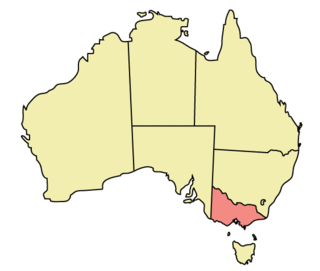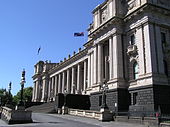
Assisted suicide – alternately referred to as medical aid in dying – means a procedure in which people take medications to end their own lives with the help of others, usually medical professionals. The term usually refers to physician-assisted suicide (PAS), which is an end of life measure for a person suffering a painful, terminal illness. Once it is determined that the person's situation qualifies under the physician-assisted suicide laws for that location, the physician's assistance is usually limited to writing a prescription for a lethal dose of drugs.

The Rights of the Terminally Ill Act 1995 (NT) was a controversial law legalising euthanasia in the Northern Territory of Australia, which was passed by the territory's Parliament in 1995. The Act was passed by the Northern Territory Legislative Assembly on 25 May 1995 by a vote of 15 to 10, received the Administrator's assent on 16 June 1995, and entered into force on 1 July 1996. A year later, a repeal bill was brought before the Northern Territory Parliament in August 1996, but was defeated by 14 votes to 11.
The right to die is a concept based on the opinion that human beings are entitled to end their life or undergo voluntary euthanasia. Possession of this right is often understood that a person with a terminal illness, incurable pain, or without the will to continue living, should be allowed to end their own life, use assisted suicide, or to decline life-prolonging treatment. The question of who, if anyone, may be empowered to make this decision is often the subject of debate.

The Parliament of Victoria is the bicameral legislature of the Australian state of Victoria that follows a Westminster-derived parliamentary system. It consists of the King, represented by the Governor of Victoria, the Legislative Assembly and the Legislative Council. It has a fused executive drawn from members of both chambers. The parliament meets at Parliament House in the state capital Melbourne. The current Parliament was elected on 26 November 2022, sworn in on 20 December 2022 and is the 60th parliament in Victoria.

Suicide is a crime in some parts of the world. However, while suicide has been decriminalized in many countries, the act is almost universally stigmatized and discouraged. In some contexts, suicide could be utilized as an extreme expression of liberty, as is exemplified by its usage as an expression of devout dissent towards perceived tyranny or injustice which occurred occasionally in cultures such as ancient Rome, medieval Japan, or today's Tibet Autonomous Region.

Daniel Michael Andrews is an Australian former politician who served as the 48th premier of Victoria from 2014 to 2023. He held office as the leader of the Victorian branch of the Australian Labor Party (ALP) from 2010 and was a member of the Victorian Legislative Assembly (MLA) for the district of Mulgrave from 2002 until his resignation in 2023. Andrews is the longest-serving Labor premier and fourth-most-tenured premier in Victorian state history.

The legality of euthanasia varies depending on the country. Efforts to change government policies on euthanasia of humans in the 20th and 21st centuries have met limited success in Western countries. Human euthanasia policies have also been developed by a variety of NGOs, most notably medical associations and advocacy organizations. As of 2023, euthanasia is legal in Belgium, Canada, Colombia, Luxembourg, the Netherlands, New Zealand, Portugal, Spain and all six states of Australia. Euthanasia was briefly legal in the Northern Territory between 1996 and 1997, but was overturned by a federal law. In 2021, a Peruvian court allowed euthanasia for a single person, Ana Estrada.
Reason Australia, commonly referred to as the Reason Party or as simply Reason, is an Australian political party founded in 2017. Its leader, Fiona Patten, describes the party as a "civil libertarian alternative". Patten was elected to the Victorian Legislative Council as at the 2018 state election in the Northern Metropolitan Region, after formerly being elected as a Sex Party member for the same seat in the 2014 state election.
Euthanasia became legal in New Zealand when the End of Life Choice Act 2019 took full effect on 7 November 2021. It is illegal to "aid and abet suicide" under Section 179 of the New Zealand Crimes Act 1961. The clauses of this act make it an offence to "incite, procure or counsel" and "aid and abet" someone else to commit suicide, regardless of whether a suicide attempt is made or not. Section 179 covers both coercion to undertake assisted suicide and true suicide, such as that caused by bullying. This will not change under the End of Life Choices Act 2019, which has provisions on coercion of terminally ill people.

Laws regarding euthanasia or assisted suicide in Australia are matters for state and territory governments. As of May 2022 all states have passed legislation creating an assisted suicide scheme for eligible individuals. These laws typically refer to assisted suicide as "voluntary assisted dying".

The Australian state of Victoria is regarded as one of the most progressive jurisdictions with respect to the rights of lesbian, gay, bisexual, transgender and intersex (LGBTI) people.

The Constitution of Victoria is the constitution of the state of Victoria, Australia. The current constitution, the Constitution Act 1975 was enacted in 1975, and has been amended several times.

The Euthanasia Laws Act 1997 (Cth) was an Act of the Parliament of Australia to amend the Northern Territory (Self-Government) Act 1978, the Australian Capital Territory (Self-Government) Act 1988 and the Norfolk Island Act 1979 to remove the power of the Parliament of each of those territories to legalise euthanasia. The law was enacted in response to the enactment of the Rights of the Terminally Ill Act 1995 (NT) by the Parliament of the Northern Territory which had legalised euthanasia in the Territory. The Act was repealed by the Restoring Territory Rights Act 2022, which was passed by the federal parliament in December 2022.
The Voluntary Euthanasia Party (VEP) was a minor political party in Australia, founded in early 2013 by Corey McCann to advocate for legislative change to allow voluntary euthanasia in Australia. The party's inception was strongly supported by Dr Philip Nitschke, director of Exit International and Richard Mills, then President of Dying with Dignity NSW.
Emma Jayne Kealy is an Australian politician. She has been a National Party member of the Victorian Legislative Assembly since November 2014, representing the Legislative Assembly seat of Lowan.

The End of Life Choice Act 2019 is an Act of Parliament in New Zealand that gives people with a terminal illness the option of receiving assisted suicide or euthanasia. The act came into force on 7 November 2021, twelve months after the 2020 euthanasia referendum was declared in favour of the legislation.
Western Australia was the second Australian state to legalise voluntary assisted dying, after Victoria. The Voluntary Assisted Dying Act 2019 was passed into law on 19 December 2019, and came into effect on 1 July 2021.

The 47th Parliament of Australia is the current meeting of the legislative body of the Commonwealth of Australia, composed of the Australian Senate and the Australian House of Representatives. The May 2022 federal election gave the Australian Labor Party control of the House; Labor won 77 seats, and gained an additional seat in April 2023 due to its victory in the Aston by-election, giving it a three-seat majority government. Labor leader Anthony Albanese became the 31st Prime Minister of Australia, and was sworn in by the Governor-General David Hurley on 23 May 2022. The 47th Parliament opened in Canberra on 26 July 2022.

The 57th Parliament of Queensland is the current meeting of the unicameral chamber of the Queensland Parliament known as the Legislative Assembly. The 2020 state election gave the Labor Party a majority (control) in parliament, winning fifty-two of ninety-three seats (55.91%). The First day of the opening of the 57th Parliament of Queensland was 24 November 2020.












